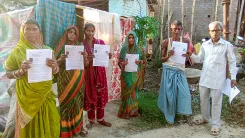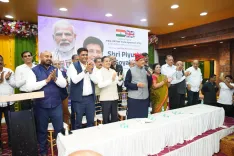Did APEDA Really Reject Allegations on Organic Cotton Certification?

Synopsis
Key Takeaways
- APEDA has strongly refuted allegations of irregularities in organic cotton certification.
- The NPOP includes over 4,712 active organic grower groups.
- Certification bodies conduct annual audits to ensure compliance.
- Farmers do not receive the alleged subsidy under NPOP.
- India's organic certification aligns with international standards.
New Delhi, July 27 (NationPress) The Agricultural and Processed Food Products Export Development Authority (APEDA) has firmly dismissed the claims made by an opposition leader regarding irregularities in organic cotton certification under the National Programme for Organic Production (NPOP), as stated by the Ministry of Commerce and Industry on Sunday.
In the official statement, APEDA described the assertions made during a recent press conference as unfounded, unsubstantiated, and misleading, indicating that these allegations only serve to undermine the credibility of India’s strong regulatory framework.
The NPOP, established in 2001 by the Department of Commerce, is India’s official organic certification program for exports.
This program is administered by APEDA and adheres to a stringent third-party certification process. It has been recognized as equivalent to the standards of the European Union, Switzerland, and is accepted by the UK, with a mutual recognition arrangement also in place with Taiwan.
Regarding the allegations that organic cotton production is limited to Madhya Pradesh and a few farmer groups, APEDA asserted that this assertion is entirely incorrect.
As of July 19, the NPOP encompasses 4,712 active organic grower groups across 31 states and Union Territories, representing nearly 19.3 lakh certified farmers who cultivate a diverse range of crops such as cereals, pulses, oilseeds, tea, coffee, spices, and cotton.
Furthermore, APEDA clarified that cotton is only covered under NPOP up to the production stage.
Post-production activities like ginning and processing fall under separate private certifications, not NPOP.
The claim that farmers receive Rs 50,000 per hectare as a subsidy under NPOP was also rejected by APEDA, clarifying that neither the Department of Commerce nor APEDA provides such financial assistance under this program.
To maintain credibility, NPOP has a multi-layered system of checks. Both government and private Certification Bodies conduct annual audits and inspections of farms.
These inspections are further overseen by the National Accreditation Body (NAB) through unannounced audits coordinated by APEDA.
Any instances of non-compliance or malpractice are thoroughly investigated, and strict measures are taken against defaulting certification bodies or grower groups.







